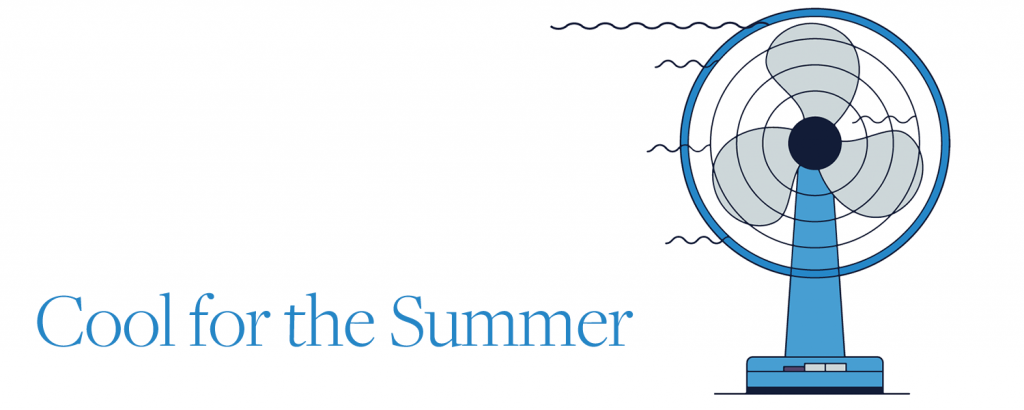
For most people, summer is usually a time of fun, rest and relaxation. But with the sun and blazing heat, it can also be extremely dangerous.
Our body has an internal temperature and it works every minute to maintain that standard. As temperature rises, so does your internal body temperature. Excessive heat forces your body to work harder than normal, which is often the root cause of heat-related illnesses such as dehydration, heat exhaustion and heat stroke. Essentially the heat forces your body to work beyond its limits.
For seniors, as we age, our bodies are not as efficient at regulating its own temperature. Seniors do not sweat as much as they once did, which is one of the body’s most essential ways to regulate its internal temperature. A senior’s body also stores fat very differently, which complicates the body’s self-regulating temperature even more. This is why heat and sun exposure can be extremely dangerous to anyone over 65 years old and is why seniors suffer more from heat stroke than younger people throughout the summer.
From 1999-2009, roughly 40 percent of all heat-related deaths in the U.S were adults over 65 years old.
As we get ready to face the hottest season, Rome Health and Rehab offers seniors, their families, friends and caregivers these reminders and helpful tips in having a fun, safe summer.
Stay Hydrated
Seniors are more susceptible to dehydration and can also become less aware of their thirst. Remember to drink water often, even if you are not thirsty. A good rule of thumb is to drink water with every meal and every one to two hours in between.
Keep Your Cool
Stay cool! Even small increases in temperature can be very serious for seniors, especially those with chronic medical conditions. This doesn’t mean stay locked in-doors; you still need to get out and be active, but you can find alternate cool ways to get out. Shopping malls/centers, movie theaters, restaurants, museums, senior centers and libraries provide welcome, cool spaces.
Tips in keeping your own home cool: block the sun and heat by keeping blinds and shades closed. If you must bake, do it early in the morning. Have your AC serviced to ensure it’s in proper working condition and make sure ceiling fans are properly working as well.
Exercise Smart
If you enjoy outdoor activities such as walking or gardening, make sure to wear the proper clothing, and keep track of time. Don’t stay out for long periods of time and make sure to drink even more water than usual when exercising. Also, consider getting outdoor exercise done earlier in the morning or later in the evening, when the sun is not at its peak.
Wear the Right Stuff
Wear light-colored, loose fitting clothing, hats and sunscreen. Sunscreen is essential for everyone; from infants to seniors, it is a must in protecting our skin from harmful UV rays and preventing sunburn and other complications as serious as skin cancer. Many medications make one more prone to sunburn, so wearing sunscreen and hats is even more important.
Know the Risks of Hyperthermia
During the summer, be particularly cautious about abnormally high body temperatures — a condition known as hyperthermia. Heat stroke is an advanced form of hyperthermia that can be very serious, sometimes life threatening, and requires immediate medical attention. Seniors sometimes have a harder time knowing when they are dehydrated and their bodies have more difficulty regulating their temperatures and are more prone to heat stroke. Untreated heatstroke can damage your brain, heart, kidneys and muscles. Make sure to know the warning signs and get medical attention immediately if you or anyone you know (senior or not) is experiencing these symptoms:
-Body temperature greater than 104 degrees
-A change in behavior, such as acting confused, agitated or grouchy
-Dry, flushed skin
-Nausea and vomiting
-Headache
-Heavy breathing or a rapid pulse
-Not sweating, even if it’s hot out
-Fainting
If you or someone you know, start to feel any of these symptoms, call 911 immediately and take action. Get out of the heat, lie down and cool your body off with any means you have nearby: a cold bath or shower, water hose, sponge with cold water, place ice packs or cold wet towels on the body especially on the neck, head, armpits and groin area.
Stay in Touch and Meet the Neighbors
Communicate! Let friends and family know if you’ll be spending an extended period of time outdoors, even if only gardening. Do you know your neighbors? See if a younger neighbor, perhaps even one of their kids, can do yard work for you or at least come by and check on you occasionally. If you’re a neighbor of a senior, ask what you can do to help and pay special attention, calling authorities immediately if you see anything out of the ordinary. For everyone involved, the extra company and friendship is just an added bonus.
Know Who to Call
Prepare a list of emergency contact numbers and place them in a highly visible area (on the refrigerator, by a phone, etc.). These numbers will always come in handy to you in an emergency situation, but also a loved one, neighbor or friend.
Rome Health and Rehab has been serving and caring for Rome and surrounding communities for over 50 years. With a management team that has over a combined 150 years of service, a highly respected 24-hour skilled nursing team, a renowned therapy team offering both inpatient and outpatient physical, occupational and speech therapy services, and a physician team led by Medical Director Dr. Charles Betz with two full-time Nurse Practitioners, wound and pain management physicians, Rome Health and Rehab is committed and dedicated in caring for our Rome community.



